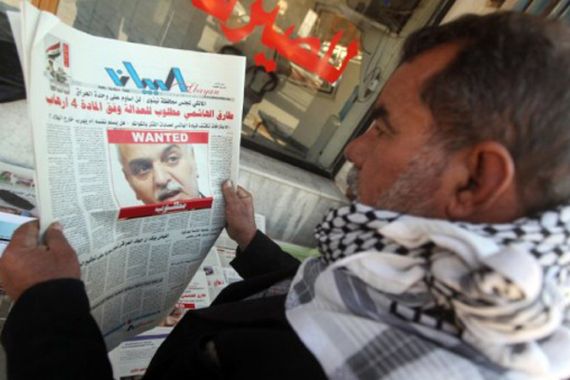
Iraq’s most wanted
Will the issuing of an arrest warrant for Iraq’s vice president cause sectarian tensions to flare?
Tariq al-Hashemi, Iraq’s Sunni vice president, is a wanted man, but his allies say the country is being driven into sectarian conflict.
|
“The whole thing is not political; there is a legal case, five judges … issued a warrant for his arrest. It cannot be that five judges who are from different sects of Iraq, they cannot all be belonging to Mr al-Maliki. Those people issued a warrant … so it’s very clear; it’s nothing to do with politics. Political rivalry is not solved this way; there are other means of resolving political differences. “ – Saad al-Muttalibi, a member of the State of Law Coalition |
Al-Hashemi has strongly denied claims that he ran a death squad that targeted senior politicians. The accusations date back to the height of the war in 2006 and 2007, but the arrest warrant against Iraq’s most senior Sunni politician for allegedly planning attacks against government officials was issued just days after the departure of US troops.
Al-Hashemi is an outspoken critic of Nouri al-Maliki, Iraq’s Shia prime minister, and last weekend his Iraqiya political bloc boycotted parliament because al-Maliki refused to give up control over key posts. They have accused the prime minister of trying to divide the country. Although it is a secular bloc, Iraqiya has the support of many Sunnis.
On Tuesday, al-Hashemi held a press conference in the Kurdish town of Irbil, where he dismissed the accusations against him as purely political and said: “Maliki is behind the whole issue. The country is in the hands of Maliki. All the efforts that have been exerted to reach national reconciliation and to unite Iraq are now gone. So yes, I blame Maliki.”
In a brief statement, Jalal Talabani, Iraq’s president, said he was surprised at the announcement of the warrant and that the matter should be dealt with quietly.
After a long impasse, Iraq’s main political parties agreed to a power sharing deal last year. The deal splits the prime minister’s office, presidency, two deputy prime ministers and two vice-presidents among Shia, Sunni and Kurdish officials.
|
“[That] the process is being led politically and not through judges or through people of law enforcement is sending the wrong signal.“ – Hiwa Osman, a former media advisor to President Jalal Talabani |
Al-Maliki has been accused of cracking down on political opponents and in addition to the arrest warrant issued for al-Hashemi, al-Maliki has called for a vote of no confidence in his own deputy, Saleh al-Mutlaq. Al-Hashemi and al-Mutlaq are the top two Sunni politicians in Iraq.
So, are the charges against the Iraqi vice president politically motivated? And what effect will this have on Iraq’s political scene? With US troops now gone, is Iraq about to become more unstable and could sectarian tensions flare?
Inside Story, with presenter Hazem Sika, discusses with guests: Saad al-Muttalibi, a member of the State of Law Coalition and a former director of international affairs at the Ministry of National Dialogue; Hiwa Osman, a writer and commentator as well as a former media advisor to President Jalal Talabani; and Ali al-Saffar, a Middle East analyst at the Economic Intelligence Unit.
| “In Iraq perception usually trumps reality, and the perception here is that this is a politicised movement against Tariq al-Hashemi … I think the timing and the way it’s been managed [is] going to raise that topic of politicisation, of sectarianisation.”
Ali al-Saffar, a Middle East analyst at the Economic Intelligence Unit |
Note: The Iraqiya bloc declined to appear on the progamme.